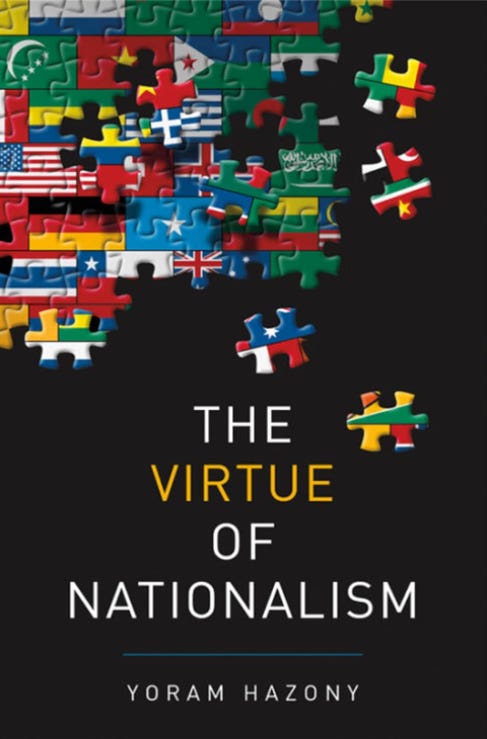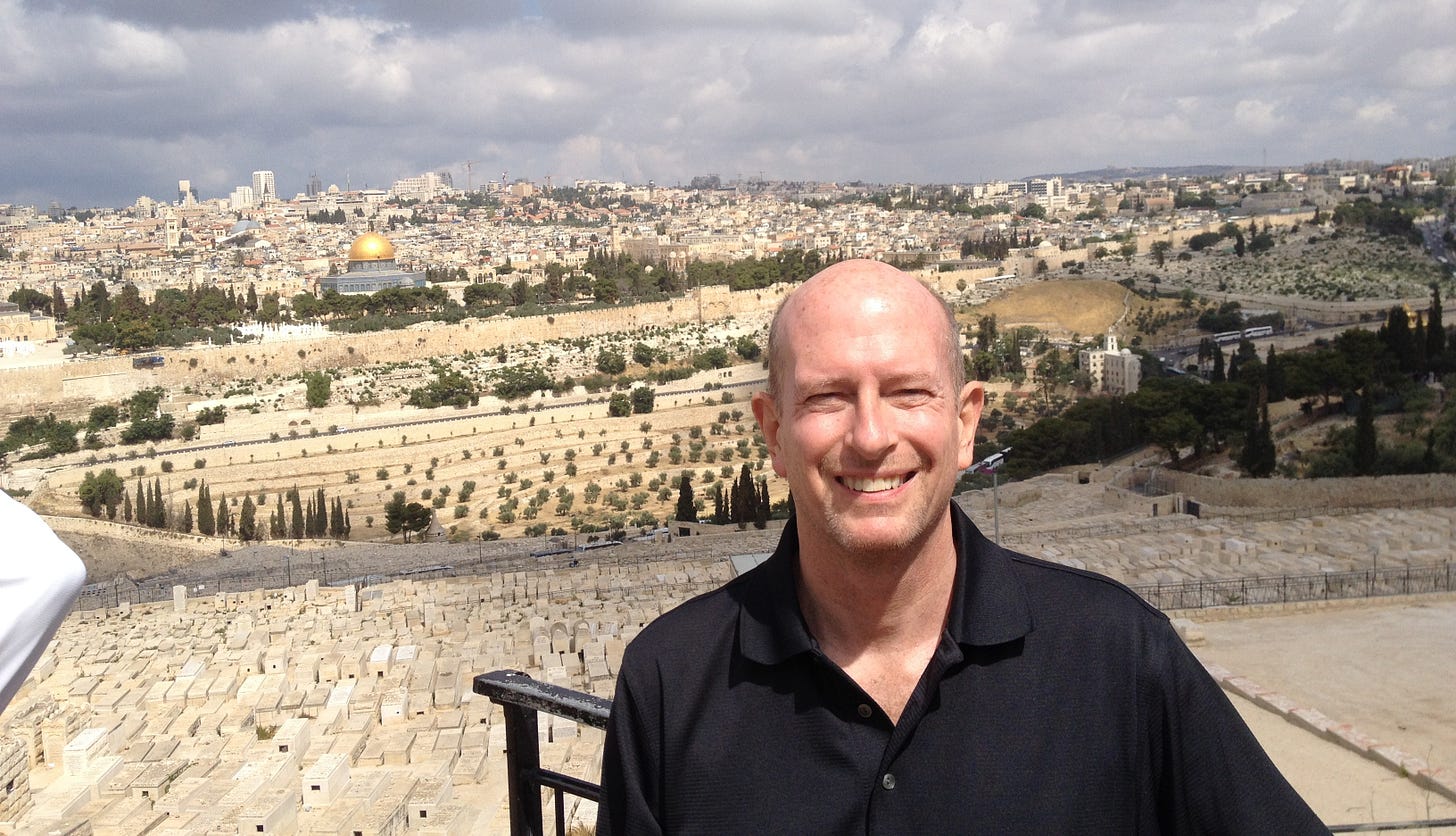How Israel Made Me a Nationalist (And Also a Cosmopolitan)
Nationalism is not an outbreak of fascism, as far-left progressives predictably claim, but of democracy itself
For two years between my junior and senior years in college and then for another year afterwards, I traveled around Europe and the Middle East, finally spending time in Israel and completing two ulpanim. Lots of people do this. Or did.
An ulpan is a six-month intensive Hebrew course for olim, new immigrants to Israel, run by the Jewish Agency.
For four hours a day, six days a week, I studied the Hebrew language.
My classmates were new immigrants from all over the world – Jews from Russia, South America, Germany, South Africa, Sweden and Denmark. The only common language we shared was Hebrew. The joke was that you had to study your verb tables if you wanted a date on Friday night.
I wasn’t an immigrant myself. I was an Irish Catholic from Seattle. As a philosophy and theology student at a Jesuit university, I had a longtime fascination with Judaism and with the founding of the modern State of Israel.
It’s difficult to describe how completely Israel changed me.
I arrived, age 21, a dreamy Catholic pacifist enamored of the Berrigan Brothers, Thomas Merton and various left-wing causes. I left a committed Zionist and believer in national self-determination and the duty, not just the right, of self-respecting people to defend their homelands.
Israel is a tiny country, roughly the size of the U.S. state of Massachusetts, surrounded by bitter enemies on all sides. All of my Israeli friends, men and women, were in the Army.
My vaguely pacifist beliefs from the antiwar, post-Vietnam 1970s were quickly shattered by the realities these baby-faced young men and pretty girls faced.
I was in Israel during the Lebanon War. My friends weren’t shipped off to fight wars in distant countries they didn’t even know existed, like Americans were. They fought battles 50, sometimes just 10 miles from where they lived.
The whole country was in the military. Girls served two years, boys three, and the men stayed in the milu’im, or Army reserves, until age 55.
I was always shocked when I stood in line at a branch of Bank Leumi and half the young women in the line had Uzis slung over their shoulders. No bank robberies in Israel!
More than once, riding in an Egged bus to some small town, I had to politely ask the army kid next to me if he’d mind moving the muzzle of his Galil rifle out of my rib cage.
What also astonished me was the culture.
Jewish culture obviously penetrates every aspect of life in Israel, from the Hebrew language to the myriad festivals of Judaism. Yet what most impressed me was the pioneering spirit, the sense of nation-building, that even young people shared. Everyone had a stake in the country.
After I finished my senior year in college, I shipped a motorcycle to Israel from Los Angeles and did a second, more advanced ulpan near the seaside town of Zikron Ya’akov, just south of Haifa, for another year. I seriously considered staying there.
I didn’t know it at the time, but Israel made me a nationalist.
Israel taught me to see nations, not as abstract ideas or ideals, but as real extended-family communities with a shared commitment to a specific history, land and culture.
I returned home from Israel, in the early 1980s, a far more committed American patriot than I had been when I left. I could no longer mouth the anti-military, “world government” platitudes of my well-meaning but mostly clueless Jesuit teachers.
My Israeli friends didn’t fight for “democracy” or even for the Jewish people: they fought to defend their mothers and sisters and friends from attacks by terrorist groups out to destroy them.
Yet strangely but not so strangely, Israel also made me a committed cosmopolitan.
Israel is a polyglot place where, just strolling down a street in Tel Aviv or Jerusalem, you can hear Hebrew, Arabic, Russian, French, German or Yiddish, and a dozen other languages. It’s a land of many different ethnic groups, from the Druze to the Falashim, Armenians to Russians, yet sharing a common commitment to Israel and the Jewish people.
Of course, seventy years of constant warfare have made Israelis as bigoted as anyone else in the world, with open expressions of contempt for Arabs not uncommon.
Yet the most sympathetic accounts of the Palestinian predicament you’ll ever see are not from virtue-signaling Hollywood liberals who have never been outside of Brentwood but from Israeli films such as Ets Limon (The Lemon Tree). Precisely because Israelis are such committed nationalists, they appreciate the national aspirations of others.
But it wasn’t until I met Yoram Hazony, the Israeli political philosopher and organizer of international National Conservatism conferences, that I truly understood my own strange history and outlook.
In his influential 2018 book The Virtue of Nationalism and his earlier work, The Philosophy of Hebrew Scripture, Hazony outlined the competing visions at the heart of our current global conflict.
On the one hand, there is the imperial (globalist) mindset of multinational corporations and many western government elites. This mindset wants to create a single world economic order that prioritizes economic efficiency. Other considerations – of culture, language, family, religion – are secondary or unimportant.
On the other, there are small nation-states and their people who want to preserve the unique heritage, languages and cultures of specific peoples – whether it’s the Finns in Finland, the Jews in Israel, the Japanese in Japan, the French in France, or the Irish in Ireland.
The challenge for Hazony and other genuine nationalists is to articulate the legitimate reasons for preserving the unique culture of nations and stopping mass immigration without adopting the xenophobia that can infect any community that is threatened by outsiders.
Yet this is difficult to pull off. The classic way to do it is to support so-called civic nationalism (a commitment to a nation but not to an ethnic group) but reject so-called ethno-nationalism.
Civic nationalism makes perfect sense in an American context because the United States, unlike most countries in the world, has so many ethnic groups within its borders. While America was not founded as a “nation of immigrants” as progressives falsely claim – it was created by pioneers who subsequently welcomed newcomers after the nation was created -- it has, over the centuries, for good or for ill, become one.
The problem is, for many if not most countries, civic nationalism and ethno-nationalism are one and the same.
The citizens of Poland are 97 percent ethnic Poles. The citizens of Japan are 98 percent ethnic Japanese. Thus, nationalism for Poles is, by its very nature, ethnic nationalism, a commitment to the Polish people – and similarly for Italians, French, Swedes, Danes, Koreans, the Japanese, the Tibetans, and so on.
Israel, too, was founded as a “Jewish state” for the Jewish people, and thus Zionism is, by definition, a kind of ethnic nationalism – as the many enemies of Israel never tire pointing out.
Just as it is reasonable for Israel to limit the number of non-Jews who can immigrate and live in the country, to preserve the uniquely Jewish character of the nation, so, too, it’s reasonable for Poles and Hungarians to want to preserve Poland for the Poles and Hungary for the Hungarians.
The recent resurgence of nationalism and populism across Europe is not an outbreak of fascism, as far-left progressives predictably claim, but of democracy itself. Nationalism is a popular citizen revolt against economic policies that serve the interests primarily of the very rich and multinational corporations, not the interests of ordinary citizens.
Yet it’s taken most of us many, many years to see that, to see what was done in our name in back room deals in Brussels, Davos and Washington, DC. For me, an Irish-Catholic from Seattle, this gradual awakening began in Israel in the late 1970s and early 1980s.
It was there that I experienced the pioneering spirit of the early Zionists who set out to build a nation, and a unique culture, for themselves and their descendants, in a specific place with a specific history.
This sense of nation-building is what the peoples of the West are searching for. It is why so many Americans instinctively voted for Donald Trump with his promise to “make America great again.”
A genuine, humanistic, cosmopolitan nationalism that respects the rights of all people to self-determination can overcome the malaise of the past decades -- and even help younger generations regain their sense of heroism and shared purpose.
It is a way out of the present darkness into a brighter, more optimistic future.
Robert J. Hutchinson is the author of numerous books of popular history, including Searching for Jesus: New Discoveries in the Quest for Jesus of Nazareth (Thomas Nelson), The Dawn of Christianity (Thomas Nelson), The Politically Incorrect Guide to the Bible (Regnery) and When in Rome: A Journal of Life in Vatican City (Doubleday). Email him at: roberthutchinson@substack.com





